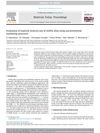 1 citations
,
August 2023 in “Andrology”
1 citations
,
August 2023 in “Andrology” Finasteride changes hormone levels and certain proteins in rats, but these effects can be reversed after stopping the drug.
October 2022 in “Biomolecules” Allopregnanolone can reduce gut inflammation and normalize neurotransmitter levels after finasteride withdrawal.
2 citations
,
July 2021 in “The Journal of Sexual Medicine” Gene expression differences in PFS patients suggest a potential organic cause for symptoms.
 3 citations
,
April 2021 in “Journal of Medicinal Chemistry”
3 citations
,
April 2021 in “Journal of Medicinal Chemistry” Finasteride may affect PNMT, causing side effects.
 17 citations
,
September 2020 in “Journal of Endocrinological Investigation”
17 citations
,
September 2020 in “Journal of Endocrinological Investigation” Post-finasteride patients show changes in gut bacteria, possibly causing various symptoms.
 7 citations
,
June 2020 in “Translational Andrology and Urology”
7 citations
,
June 2020 in “Translational Andrology and Urology” Finasteride for hair loss may cause lasting sexual, genitourinary, mental, and anti-androgenic side effects in young men.
 26 citations
,
December 2019 in “Neurobiology of Stress”
26 citations
,
December 2019 in “Neurobiology of Stress” Post-finasteride syndrome causes lasting sexual, neurological, and physical side effects in some people after taking finasteride.
 37 citations
,
September 2018 in “Psychoneuroendocrinology”
37 citations
,
September 2018 in “Psychoneuroendocrinology” Finasteride treatment in male rats causes long-lasting effects on depression-like behavior, brain cell growth, inflammation, and gut bacteria composition.
 58 citations
,
April 2017 in “The Journal of Steroid Biochemistry and Molecular Biology”
58 citations
,
April 2017 in “The Journal of Steroid Biochemistry and Molecular Biology” Post-finasteride patients show changed neuroactive steroid levels, possibly causing erectile dysfunction and depression.
 14 citations
,
December 2016 in “Sexual Medicine”
14 citations
,
December 2016 in “Sexual Medicine” Finasteride side effects in young men may be linked to specific gene variations.
 50 citations
,
September 2016 in “The Journal of Clinical Endocrinology and Metabolism”
50 citations
,
September 2016 in “The Journal of Clinical Endocrinology and Metabolism” Finasteride for hair loss may cause persistent sexual symptoms, depression, anxiety, and lower quality of life.
 21 citations
,
April 2016 in “Journal of Dermatological Treatment”
21 citations
,
April 2016 in “Journal of Dermatological Treatment” Finasteride may cause mental and sexual side effects, with hand preference and sexual orientation possibly affecting severity.
 33 citations
,
December 2015 in “Neuroendocrinology”
33 citations
,
December 2015 in “Neuroendocrinology” Finasteride treatment changes brain steroid levels and receptors, affecting brain function even after stopping treatment.
111 citations
,
August 2015 in “Reviews in Endocrine and Metabolic Disorders” 5α-reductase inhibitors may cause persistent sexual dysfunction and depression, needing more research on long-term effects.
 44 citations
,
April 2015 in “PubMed”
44 citations
,
April 2015 in “PubMed” Finasteride for hair loss may cause long-lasting side effects like impotence and low libido, but trials lack proper safety reporting.
 16 citations
,
September 2014 in “International Journal of Biological Markers”
16 citations
,
September 2014 in “International Journal of Biological Markers” Longer CAG and GGN repeats increase alopecia risk, but no significant link to post-finasteride syndrome found.
 36 citations
,
June 2014 in “PLOS ONE”
36 citations
,
June 2014 in “PLOS ONE” Finasteride, a hair loss drug, may cause long-term sexual side effects due to changes in hormone receptor levels.
 81 citations
,
June 2014 in “American Journal of Men's Health”
81 citations
,
June 2014 in “American Journal of Men's Health” Finasteride can cause lasting sexual, emotional, and cognitive issues, with varying severity.
 61 citations
,
April 2014 in “The Journal of Steroid Biochemistry and Molecular Biology”
61 citations
,
April 2014 in “The Journal of Steroid Biochemistry and Molecular Biology” Finasteride affects brain and blood steroids, causing lasting sexual and emotional side effects.
 73 citations
,
July 2013 in “The Journal of Sexual Medicine”
73 citations
,
July 2013 in “The Journal of Sexual Medicine” Finasteride use changes brain chemicals, causing lasting sexual issues and anxiety/depression.
 19 citations
,
November 2012 in “BJUI”
19 citations
,
November 2012 in “BJUI” Left-handed men experience more sexual side effects from finasteride treatment.
 112 citations
,
July 2012 in “The Journal of Sexual Medicine”
112 citations
,
July 2012 in “The Journal of Sexual Medicine” Finasteride may cause long-lasting sexual side effects.
 185 citations
,
March 2011 in “The Journal of Sexual Medicine”
185 citations
,
March 2011 in “The Journal of Sexual Medicine” Finasteride for hair loss can cause long-lasting sexual side effects like low libido and erectile dysfunction.
 581 citations
,
October 1998 in “Journal of The American Academy of Dermatology”
581 citations
,
October 1998 in “Journal of The American Academy of Dermatology” Finasteride safely and effectively treats male pattern hair loss, but may cause reversible sexual issues and harm male fetuses.


























